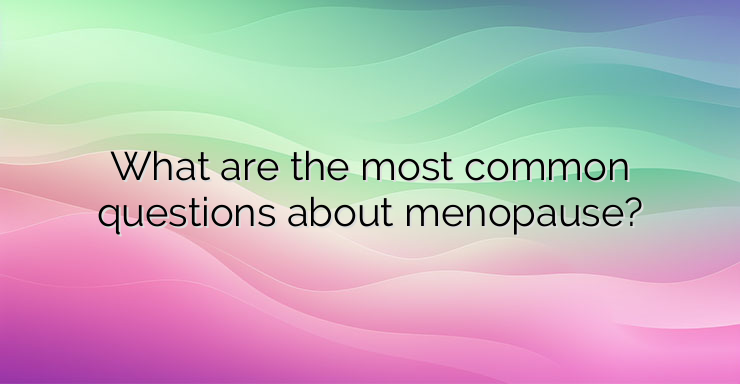Menopause is a period of every woman’s life, which is characterized by a decrease in the levels of female sex hormones – estrogens and progesterone, and the subsequent lack of them, amenorrhea and infertility. For a condition to be defined as menopause, it is necessary that the absence of menstruation has lasted for a period of at least one year. The average age of onset of menopause is around 51 years, and it normally occurs between the ages of 45 and 55. There are many questions and topics about menopause that excite and interest women who are about to go through or are going through this period. We will consider the most interesting and most useful of them: 1. Is the transition to menopause smooth and what changes accompany it? Usually, before menopause occurs, there is a period of 2 to 8-10 years, denoted by the term perimenopause. During perimenopause, changes in the duration and regularity of the monthly cycle gradually begin – it is possible that in some months menstruation may be absent, the duration of the monthly cycle may increase or decrease, changes may occur in its abundance. The reason for the occurrence of these changes is the fluctuating levels of estrogens and progesterone – their levels begin to decrease, but this does not exclude the possibility of hormonal peaks. Along with the changes in the monthly cycle, the appearance of irritability, hot and cold waves, night sweats, and a decrease in libido are possible. 2. When does menopause occur in women with hysterectomy? The answer to this question depends on a single factor – whether the hysterectomy is combined with a bilateral oophorectomy (removal of both ovaries). With bilateral oophorectomy, the so-called operative (induced) menopause, as its onset is abrupt, immediately after the surgical intervention, and its symptomatic course is more severe. In women in whom both or one of the ovaries are preserved, induced menopause does not occur. Induced menopause can also occur in women undergoing chemotherapy or radiation therapy to the pelvic area. Of course, in some of them, the disorder in the functioning of the ovaries can be temporary, followed by the restoration of their normal functions. 3. Can I get pregnant during perimenopause? Yes, getting pregnant is possible. Although estrogen levels decrease, their production is not completely stopped. Periods of no menstruation are usually followed by periods of menstruation, during which fertilization may also occur. 4. Does the menopause occur earlier in female smokers? Studies show that women who smoke experience menopause about a year earlier. Toxins in cigarettes lead to lower estrogen levels, which can cause premature ovarian failure and earlier menopause. 5. What are the most common symptoms and consequences of menopause? The most important symptom of menopause is the absence of a monthly cycle for a period of at least one year.The lack of estrogens leads to vaginal dryness, which makes sexual intercourse difficult. Irritability, depressive states, the appearance of hot and cold waves, night sweats are characteristic. A large percentage of postmenopausal women gain significant weight due to a slowing of basal metabolism, which in turn increases the risk of cardiovascular events. The risk of osteoporosis is also increased. 6. Is there any therapy during menopause and what is it? In case of severe symptoms, it is possible to use hormonal therapy with oral contraceptives in the lowest dose for the shortest possible period of time. However, taking contraceptives in old age carries the risk of thrombosis, breast cancer, etc., so their use should be careful. Hormonal preparations with local action are also applied – vaginal rings, tablets and creams. In some cases, antidepressant therapy is also recommended. 7. What are the alternative methods for period relief? The most important thing is calmness and acceptance of menopause as part of the normal physiological development of every woman. Good hydration, regular physical activity, a balanced diet excluding especially hot, pasta and sugary products can improve the general condition and feeling of the patient. Vitamin D supplementation is also important, as is the intake of calcium-rich foods. There are also foods that contain phytoestrogens, the intake of which would ease the menopause period. Rich in phytoestrogens are soy foods (e.g. soy milk, tofu), flaxseed, nuts (almonds, walnuts), fruits and vegetables.the intake of which would ease the menopause period. Rich in phytoestrogens are soy foods (e.g. soy milk, tofu), flaxseed, nuts (almonds, walnuts), fruits and vegetables.the intake of which would ease the menopause period. Rich in phytoestrogens are soy foods (e.g. soy milk, tofu), flaxseed, nuts (almonds, walnuts), fruits and vegetables.


Leave a Reply